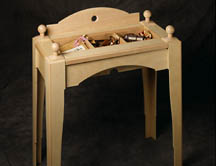Sara, a table stand for the elderly, wins award for boosting self-esteem while doubling as a support and desk
By Susan S. Lang

Several years ago, the mother of Cornell University professor Paul Eshelman was diagnosed with dementia and entered a skilled nursing facility. It pained Eshelman that his mother was in such a sterile environment and longed for her own belongings. "She kept talking about wanting a little dish cabinet that her uncle had built when she was a little girl," says Eshelman, an associate professor of design and environmental analysis in the College of Human Ecology at Cornell. "I found it in her attic and displayed it prominently on a little table stand in her room. That gave me an idea for a piece of furniture whose only function would be to reflect an individual's identity."
That idea resulted in "Sara," a table stand Eshelman designed and constructed for the elderly and those with Alzheimer's disease. It won Best of Show for Visual Arts in the Interior Design Educators Council (IDEC) Juried Design Competition in March in San Diego.
The table features a mantle-like top for memorabilia that can be inverted to reveal a divided tray that functions as an "always open" drawer and encourages rummaging through personal items. The table has handholds in each corner to serve as cane-like supports for the frail elderly. It also features widely spaced legs for stability and to allow for wheelchair access. "Its familiar curved lines, gentle edges for fragile skin, and a generous surface to display photographs or a tray to encourage manipulation are other reminders of individuality. The stand is designed to make these objects -- and residents -- feel like they belong in what is otherwise a generic setting," Eshelman says.
When an older person has to move, studies show that the disruption is associated with a loss of self-esteem as the attachment to home is severed, says Eshelman. "Those afflicted with Alzheimer's experience an eroding of the mind, but one that leaves to the end of its relentless course hints of individuality. I designed Sara as a furniture piece to reach out to these individuals." Eshelman hopes that the furniture stand will serve as a prototype for more specialized furniture to play personalized roles for the elderly who find themselves in institutional settings.
He plans to put more Saras in nursing homes or assisted-living facilities to see how they are used by residents.
Media Contact
Get Cornell news delivered right to your inbox.
Subscribe